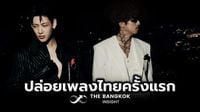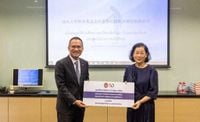In the vibrant world of online content, few figures have bridged cultures quite like Emily Srichala, the British YouTuber whose fluent Thai and infectious enthusiasm have captured the hearts—and often the surprise—of Thai street vendors and internet audiences alike. Her story, which recently made headlines on September 13, 2025, through NEWS1, is more than just a tale of social media stardom. It’s a testament to the growing bonds between Thailand and the world, and a reflection of a broader movement celebrating language, culture, and international friendship.
Emily Srichala, sometimes affectionately called “เอมิลี่ ศรีชะลา” in Thai circles, has become a household name on platforms like TikTok and YouTube. Her videos, which often feature her navigating the bustling markets of Thailand or sampling local delicacies, are marked by her impeccable command of the Thai language. This linguistic prowess never fails to surprise the Thai people she interacts with—many of whom are initially taken aback to hear a foreigner speak with such clarity and nuance. According to NEWS1, Emily’s charm lies not only in her language skills but also in her deep appreciation for Thai culture, which she strives to share with her global audience.
But Emily’s influence goes beyond simple entertainment. Her content often highlights the stories of small business owners and local vendors, shining a spotlight on the hardworking individuals who form the backbone of Thailand’s rich culinary and cultural landscape. As NEWS1 noted, her mission is clear: she wants to see these small and large shops thrive, using her platform to amplify their voices and encourage both locals and tourists to support them. In a world where viral trends can sometimes overshadow meaningful stories, Emily’s approach feels refreshingly grounded.
Her popularity on social media is unmistakable. With a growing fanbase across YouTube, TikTok, and other platforms, Emily has become something of a cultural ambassador—albeit an unofficial one. Her bilingual content not only entertains but also educates, making Thai culture more accessible to English-speaking audiences while encouraging Thais to take pride in their heritage. The impact of this cross-cultural exchange is hard to overstate, especially in an era when digital borders are increasingly porous.
Yet, Emily’s story is just one thread in a much larger tapestry. The strengthening of Thai language and culture abroad has found another champion in the academic sphere, as highlighted by a recent initiative at Shantou University in China. On September 11, 2025, the Thai Consulate-General in Guangzhou, in collaboration with Shantou Siam Gas Energy Co., Ltd., awarded a new round of educational funding—amounting to 30,000 yuan—to the university’s Thai language program. This gesture, reported by ThaitabloidCrime, comes at a significant moment: the 50th anniversary of diplomatic relations between China and Thailand.
The ceremony, held at the College of Liberal Arts’ Center for Independent Language Learning (CILL), was attended by a distinguished roster of guests. Among them were Mr. Kajthiti Wiwatwanon, the Thai Consul-General in Guangzhou; Ms. Premrasamee Meesaengchan, General Manager of Shantou Siam Gas Energy; Mr. Yu Hong, President of the Shantou University Scholarship Fund; Ms. Xu Zong Ling, Dean of the College of Liberal Arts; and several professors and administrators from both the university and the international cooperation office. Dr. Yang Jin, Assistant Professor and Head of the Thai Language Program, presided over the event, with Professor Lu Sheng providing an overview of the department’s development and Dr. Dao Jiang Peng serving as the bilingual interpreter.
The atmosphere was described as warm and uplifting, with participants noting the symbolic importance of the event. Mr. Yu Hong remarked, “This act of goodwill demonstrates the deep relationship of ‘China and Thailand, one family’ and affirms the international community’s recognition of Shantou University’s educational leadership.” His words underscored the sense of shared purpose that animated the gathering.
For Mr. Kajthiti Wiwatwanon, the occasion was also personal. As a descendant of the Teochew Chinese diaspora, he reflected on the power of language to bridge divides, saying, “Language is a bridge for communication. May students use this fund as wings to fly and become ambassadors of Chinese-Thai culture.” His sentiment was echoed by other dignitaries, who emphasized the importance of nurturing talent capable of navigating—and enriching—the cultural landscape of both nations.
The celebration wasn’t just about speeches and handshakes. Students from the Thai language program showcased their skills in impressive fashion. First-year students from the 2024 cohort delivered speeches and voice-over performances in fluent Thai, while their counterparts from the 2025 intake performed a traditional Chinese dance. The bilingual expressions of gratitude that followed served as a powerful reminder of the confidence and capability fostered by this cross-cultural education.
Importantly, the donated funds will be used to support students traveling to Thailand for further study—a move that builds on existing partnerships between Shantou University and several Thai universities. According to ThaitabloidCrime, nearly 40 students have already benefited from these collaborations, gaining firsthand experience of Thai life and language. Professor Yang Qing Jie, Dean of the College of Liberal Arts, summed up the program’s ambitions: “We will turn every good wish into the power to produce graduates.” He pledged to deepen educational cooperation between China and Thailand, with the goal of cultivating graduates who are not only linguistically adept but also culturally fluent.
After the ceremony, attendees toured the university’s Thai language activity room and library, marveling at the state-of-the-art facilities. Thai representatives in attendance praised the university’s modern amenities, noting, “The advanced facilities at Shantou University make learning a joy.” These exchanges, though seemingly small, plant seeds of friendship that promise to blossom in the years to come.
What ties these stories together—Emily’s digital journey and Shantou University’s academic outreach—is a shared belief in the transformative power of language and cultural exchange. Whether it’s a YouTuber making Thai street vendors smile or a university fostering the next generation of bilingual graduates, the message is the same: bridges between cultures are built one conversation, one lesson, and one act of goodwill at a time. In today’s interconnected world, these bridges matter more than ever.





